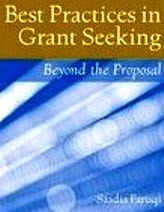Until a few years ago, I used to hate writing statements of need for grant proposals. Even though I knew what the problem was, I could never really explain it well on paper... after all, if high school drop outs are on the rise, need I really sit down and explain why that could be dangerous for not only the students concerned but the entire nation. Everyone gets it, right?
Wrong! Let's explore the many assumptions in this argument...
The first incorrect assumption is that your audience knows the problem intimately. Even though most funders are aware of the issue itself, - for example the fact that high school drop outs earn less, have lower standards of living, etcetera, they may not be aware of the full extent of the resulting socioeconomic concerns: how drop out rates relate to crime and drugs, and what effects they have on their future generations. It is the job of the grant writer to research the entire spectrum of issues that could arise from that one problem, and explain it in context with the program or project being proposed.
Secondly, funders are many times not fully cognizant of the magnitude of the problem in your specific community. They may be statewide or national funders who have broader perspectives, or they may not have the resources to collect data related to counties or even neighborhoods. Or the program officer assigned to your proposal may be new, a generalist, or just more interested in a different field. Again, the job of the grant writer is to collect community-specific information related to the cause - what are the drop out rates in not only the entire school district but in specific schools closest to the organization, and how this effects the community they live in. Many sources for such data exist, beyond the most obvious one (the Census Bureau):
Zip Skinny gives demographics by zip code and allows comparisons with other zips
City Data provides detailed profiles of cities and neighborhoods across the country
National Center for Education Statistics offers education-related reports and data
Housing Statistics compiles data on housing trends and real estate values
Other, more specific sources you could search for include crime statistics such as the online portal created by the City of Houston Police Department, or the Children Now California Report Card. A savvy grant writer will use a variety of sources to show the need, starting from the national level all the way down to the community level, and explain it in a multifaceted fashion that really brings home the need for the program or project.
And that brings me to the third but most important reason for a compelling statement of need: very often it is the only thing that really stands out in the entire proposal and makes it an attractive investment opportunity for the funder. Needs statements are so crucial that they can hardly ever be written in just one statement. They are a creative outlet for the grant writer to show his or her writing skills and use a sophisticated blend of emotion, persuasion and facts to tell the story. Below are a few samples available online, some better than others.
Needs statement for breast cancer prevention
Needs statement for a health center
Statement of Need for the 2010 census
Statement for a rural health using tables and charts in addition to a narrative
And finally, for those grant writers, like me, who may not know quite how to go about writing that big statement of need, here is a great resource which tells you the steps to take when conducting a needs assessment - this will ultimately provide sufficient information to write the needs statement. Remember that this "needs assessment" can prove invaluable to your organization as a whole, not just for the grant proposal.





No comments:
Post a Comment